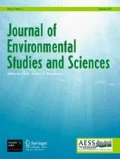Abstract
Environmental negotiations and policy decisions take place at the science-policy interface. While this is well known within academic literature, it is often difficult to convey how science and policy interact to students in environmental studies and sciences courses. We argue that negotiation simulations, as an experiential learning tool, are one effective way to teach students about how science and policy interact in decision-making. We developed a negotiation simulation, called the mercury game, based on the global mercury treaty negotiations. To evaluate the game, we conducted surveys before and after the game was played in university classrooms across North America. For science students, the simulation communicates how politics and economics affect environmental negotiations. For environmental studies and public policy students, the mercury simulation demonstrates how scientific uncertainty can affect decision-making. Using the mercury game as an educational tool allows students to learn about complex interactions between science and society and develop communication skills.
Similar content being viewed by others
References
Anderson WA, Banerjee U, Drennan CL et al (2011) Changing the culture of science education at research universities. Science 331:152–153
Arctic Monitoring Assessment Programme (2011) AMAP Assessment 2011: Mercury in the Arctic
Asal V, Blake EL (2006) Creating simulations for political science education. J Polit Sci Educ 2:1–18. doi:10.1080/15512160500484119
Aubusson P, Fogwill S, Barr R, Perkovic L (1997) What happens when students do simulation-role-play in science? Res Sci Educ 27:565–579
Bernstein S (2002) International institutions and the framing of domestic policies: the Kyoto protocol and Canada’s response to climate change. Policy Sci 35:203–236
Besley JC, Tanner AH (2011) What science communication scholars think about training scientists to communicate. Sci Commun 33:239–263. doi:10.1177/1075547010386972
Betsill M, Corell E (2001) NGO influence in international environmental negotiations: a framework for analysis. Glob Environ Polit 1:65–85
Betsill MM, Corell E (2008) NGO diplomacy: the influence of nongovernmental organizations in international environmental negotiations. MIT Press, Cambridge
Clark W, Tomich T, Noordwijk M Van, et al. (2010) Toward a general theory of boundary work: insights from the CGIAR’s natural resource management programs. Cambridge, MA
Ehrlich PR (2011) A personal view: environmental education—its content and delivery. J Environ Stud Sci 1:6–13. doi:10.1007/s13412-011-0006-3
Feinstein N (2011) Salvaging science literacy. Sci Educ 95:168–185. doi:10.1002/sce.20414
Gordon E, Schirra S, Hollander J (2011) Immersive planning: a conceptual model for designing public participation with new technologies. Environ Plan B Plan Des 38:505–519. doi:10.1068/b37013
Handelsman J, Ebert-May D, Beichner R et al (2004) Scientific teaching. Science 304:521
Jasanoff S (1994) The fifth branch: science advisors as policymakers. Harvard University Press, Cambridge
Kates RW, Clark WC, Corell R et al (2001) Sustainability science. Science 292:641–642
Kohler PM (2006) Science, PIC and POPs: negotiating the membership of chemical review committees under the Stockholm and Rotterdam conventions. Rev Eur Community Int Environ Law 15:293–303. doi:10.1111/j.1467-9388.2006.00531.x
Makinster JG (2010) The inclusion of environmental education in science teacher education. Incl Environ Educ Sci Teach Educ. doi:10.1007/978-90-481-9222-9
McLaughlin SA, Doezema D, Sklar DP (2002) Human simulation in emergency medicine training: a model curriculum. Acad Emerg Med 9:1310–1318
McMillan EE, Wright T, Beazley K (2004) Impact of a university-level environmental studies class on students’ values. J Environ Educ 35:19–27. doi:10.3200/JOEE.35.3.19-27
Mitchell RB, Clark WC, Cash DW, Dickson NM (2006) Global environmental assessments. MIT Press, Cambridge
Najam A (2001) Getting beyond the lowest common denominator: developing countries in global environmental negotiations. Massachusetts Institute of Technology, Cambridge
Najam A, Christopoulou I, Moomaw W (2004) The emergent “system” of global environmental governance. Glob Environ Polit 4:23–36
National Academy of Sciences (2000) Toxicological effects of methylmercury.
Peters HP, Brossard D, de Cheveigné S et al (2008) Interactions with the mass media. Science 321:204–205
Pielke RA Jr (2007) The honest broker: making sense of science in policy and politics. Cambridge University Press, Cambridge
Selin NE (2009) Global biogeochemical cycling of mercury: a review. Annu Rev Environ Resour 34:43–63. doi:10.1146/annurev.environ.051308.084314
Selin H (2010) Global governance of hazardous chemicals: challenges of multilevel management. MIT Press, Cambridge
Selin H (2014) Global environmental law and treaty-making on hazardous substances: the minamata convention and mercury abatement. Glob Environ Polit 14:1–19. doi:10.1162/GLEP
Selin NE, Selin H (2006) Global politics of mercury pollution: the need for multi-scale governance. RECIEL 15:258–269
Simonneaux L (2001) Role-play or debate to promote students’ argumentation and justification on an issue in animal transgenesis. Int J Sci Educ 23:903–927. doi:10.1080/09500690010016076
Somerville R, Hassol S (2011) Communicating the science of climate change. Phys Today 64:48–53. doi:10.1063/PT.3.1296
Sterman JD (2011) Communicating climate change risks in a skeptical world. Clim Chang 108:811–826. doi:10.1007/s10584-011-0189-3
Susskind LE (1994) Environmental diplomacy: negotiating more effective global agreements. Oxford University Press, Oxford
Susskind LE, Corburn J (2000) Using simulations to teach negotiation: pedagogical theory and practice. Simul. und Planspiel den Sozialwissenschaften
Weber JR, Word CS (2001) The communication process as evaluative context: what do nonscientists hear when scientists speak? Bioscience 51:487–495
Acknowledgments
This research was funded by the US National Science Foundation Atmospheric Chemistry Program (no. 1053648). We thank Larry Susskind (MIT) for his contribution to designing and writing the mercury game and Jessica Haskins and Priyanka Chatterjee (MIT) for research assistance. We thank all game participants who filled out surveys and the North American university faculty who incorporated the game into their courses. The mercury game is available to download for free at mit.edu/mercurygame and at the Program on Negotiation website at Harvard University at www.pon.harvard.edu
Author information
Authors and Affiliations
Corresponding author
Rights and permissions
About this article
Cite this article
Stokes, L.C., Selin, N.E. The mercury game: evaluating a negotiation simulation that teaches students about science-policy interactions. J Environ Stud Sci 6, 597–605 (2016). https://doi.org/10.1007/s13412-014-0183-y
Published:
Issue Date:
DOI: https://doi.org/10.1007/s13412-014-0183-y




